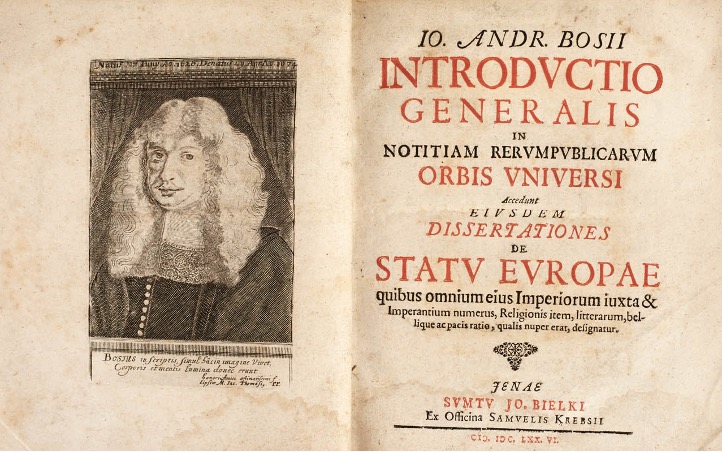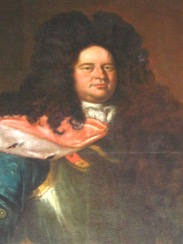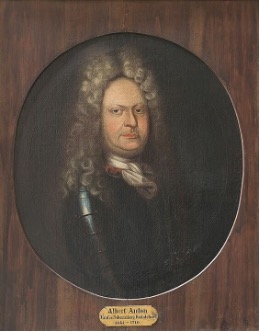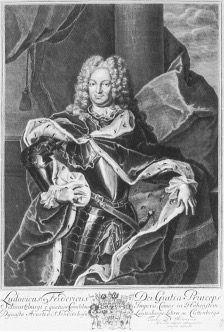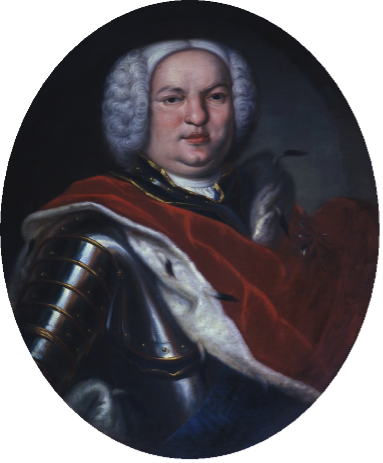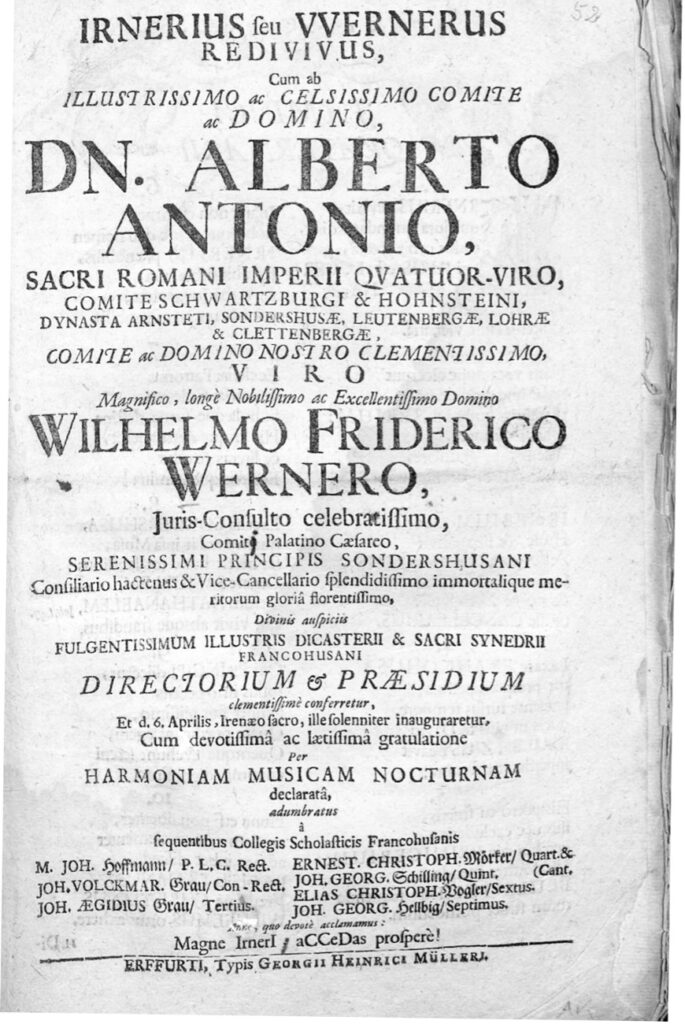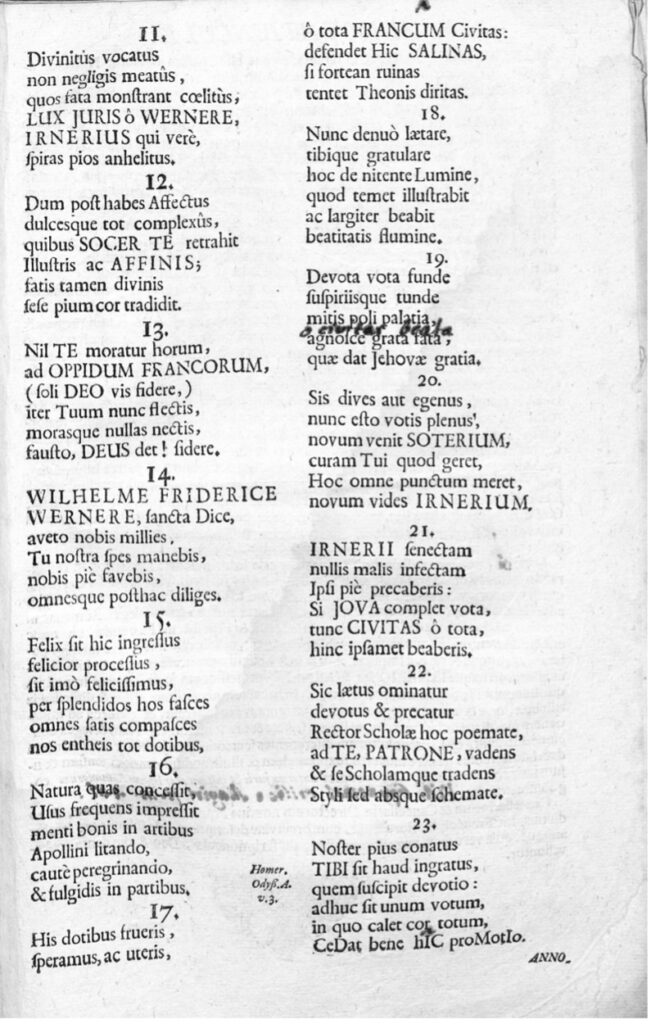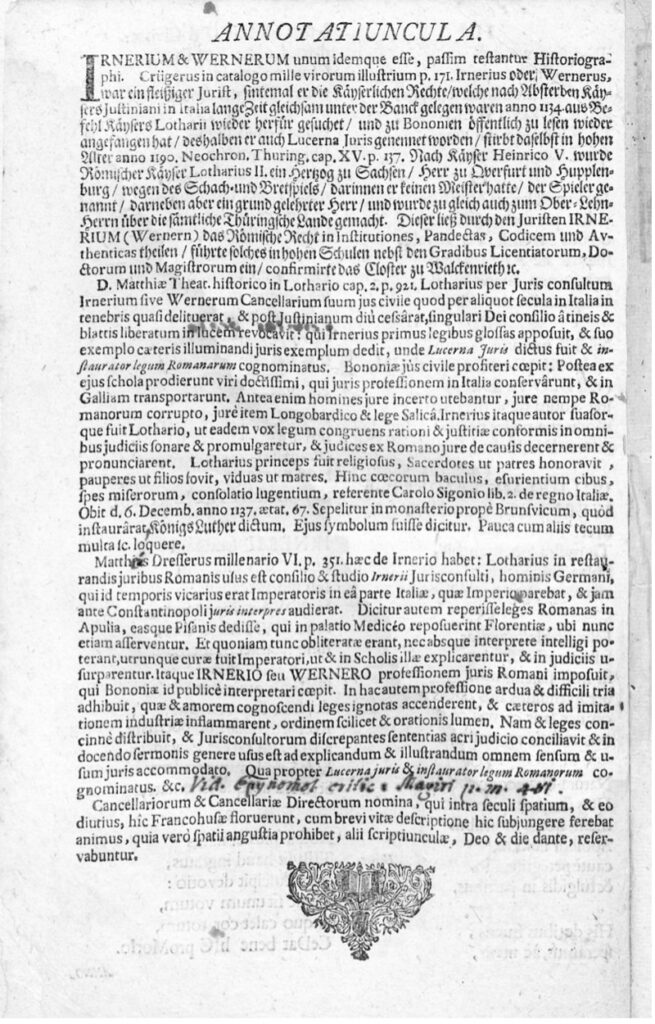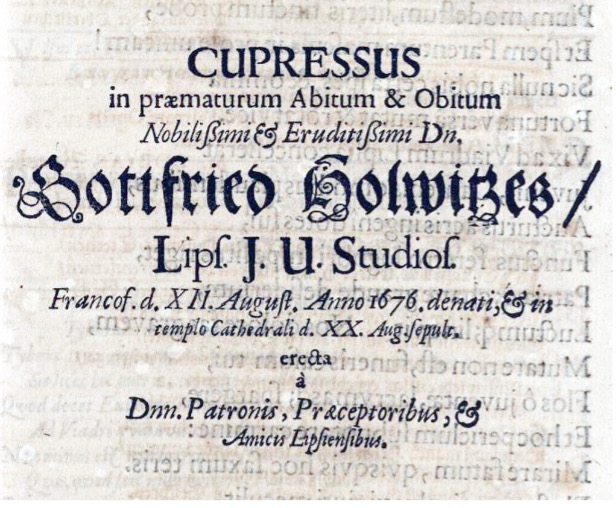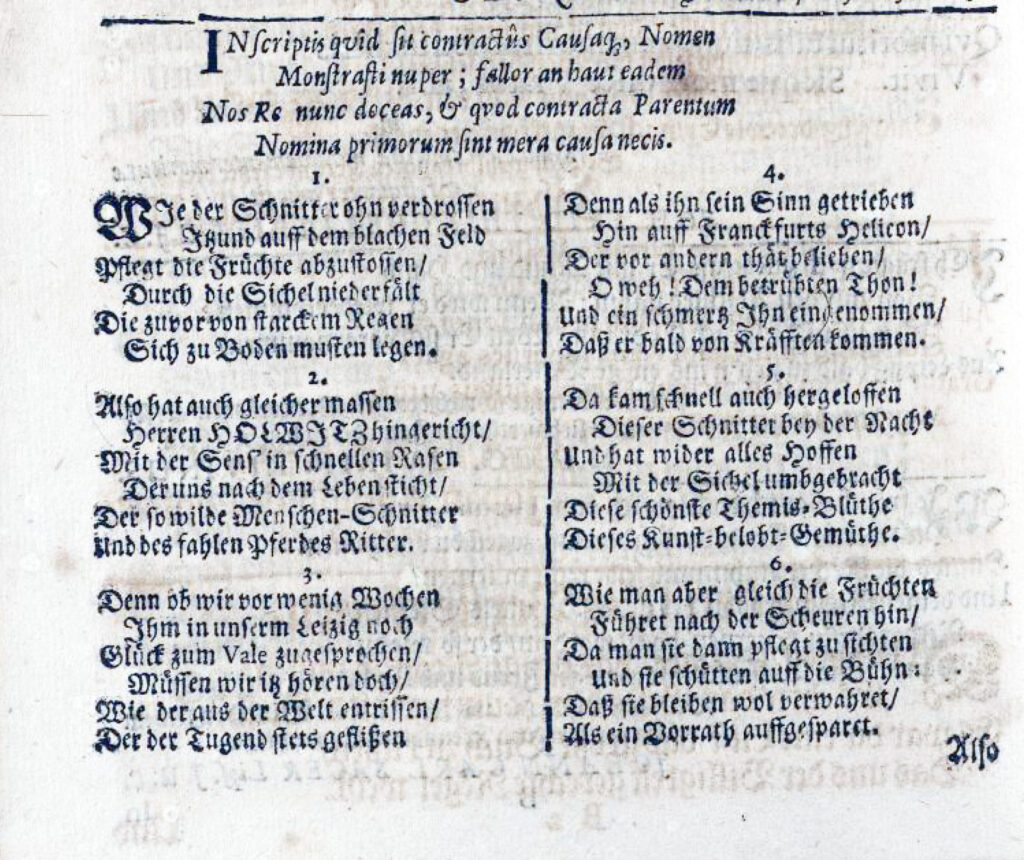Under Construction
This family history website traces the descent from various branches down to three sisters born Loeck: Nora, Ida, and Gerda.
On this page we examine the Werner family which makes its appearance upon the marriage of Dorothea Johanna Werner (born on 7th January 1686 at Sondershausen) to Friedrich Gottlieb Struve on 6th November 1709 at Jena. Dorothea died on 19th June 1742 at Kiel.
Friedrich Gottlieb Struve was born on 10th November 1676 at Jena and died on 22 July 1752 at Kiel. He was the son of Georg Adam Struve and Susannah Berlich. Details on Friedrich’s life can be found on his page.
Friedrich married three times. His first marriage was to Catharina Sophia Zülich on 12 May 1707. However, she died in 1708, probably in childbirth as their son born that year lived only three days.
His second marriage was to Dorothea Johanna Werner whose family is described on this page.
On the death of Dorothea in 1742 Friedrich married a third time to the widow Susanne Maria (Luders) Schwers in 1746.
Susanne Maria was the widow of the regimental quartermaster Dethard Christoph Joachim Schwers. Dethard and Susanne’s son Carl Friedrich Schwers married Friedrich Gottlieb Struve’s daughter (by his wife Johanna Dorothea Werner) Christiane Regina Struve (1721 – 1776). It is from this marriage that the three Loeck sisters are descended.
Johanna Dorothea’s father Wilhelm Friedrich Werner (1648 – 1723) also married three times: – first to Anne Dorothea Happe, second to Martha Elisabeth Richter, and third to Johanna Cecilia Leyser (1674 – 1726). The relationships described above are represented in the chart below:
The diagram below shows some of the Werner relationships:
Wilhelm Friedrich Werner
Wilhelm Friedrich Werner was born in Griesheim and came from a family of pastors. He was first taught by a private teacher as a child and attended the Stadtschule in Stadtilm from the age of seven. In his thirteenth year he moved to a school in Arnstadt.
He then received private lessons in Merseburg together with the sons of a nobleman. Following his father’s orders, he moved to the University of Jena in 1655 and began studying the law there. After three years at the university, he trained as a lawyer in Merseburg in legal theory and practice. After that he was in the service of the court master of Georg Wilhelm Duke of Silesia-Liegnitz, the last Silesian Piast Duke in Brieg.
After the death of the last Piast in 1675 (Georg William) he served three young nobles as Hofmeister during their university studies in Leipzig and at Altdorf. However, he did not accompany them when they went on their tour of Europe (cavalier tour) in 1681, because his then 72-year-old mother asked him to stay with her at home. In 1682 he entered the service of the House of Schwarzburg-Rudolstadt, initially as a court and consistory councillor, later as vice-chancellor. In 1702 he became the successor of Georg Ulrichs von Beulwitz in the office of a chancery director in Frankenhausen.
From his three marriages, a total of 12 children emerged, half of whom were still alive in 1721. Most of what we know about Werner comes from a summary of his life which he wrote and which was contained in his funeral sermon book.
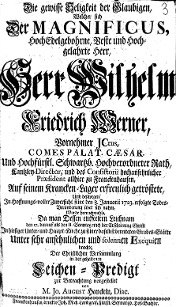
The certain bliss of the faithful,
Which ones
The MAGNIFICUS,
High noble born, Veste and High lord,
Mr. Wilhelm
Friedrich Werner,
Noble Ictus,
COMES PALAT. CAESAR.
And Hochfürstl. Schwartzb. Highly counseled,
Cantzley = Director, and the most
respectable Consistory
President all to Franckenhausen,
On his sick = bearing comfortingly comforted,
And because of that
In hope, full of confidence, his death on the 8th of January 1723
Change took over
Was listened to,
Because you have his soul ensnared
the 17th on it as the 2nd Sunday after the appearance of Christ
In the local lower and main church to his grave = place prepared there
Among very respectable and singular funeral
brought
The Christian Assembly
in the held
Corpses = sermon
presented for consideration
from M. Jo. August Hanckeln, Diac.
What follows is Werner’s summary of his own life:
I was born to this world at Grießheim, on the Ilm, in the Principality of Schwartzburg, on April 17, 1648. My deceased father was Michael Werner (16.10.1611 – 26.09.1674) who had been the pastor of Grießheim for 38 years (1637 – 1674). My mother was Anna Maria, nee Weitz.
My late father was Mr. Michael Werner, initially from Poppenhausen in Franconia, but after he was driven out by the Papists, he was pastor in Geschwenda in Arnstadt and for 37 years in Grießheim on the Ilm.
My father’s grandfather was Valentine Werner, at first Deacon at Thanne then at Francken, from there he was expelled for the sake of the gospel, and afterwards for the first time the superintendent at Eulenbur, then Archdeacon to Suh and then to Opfferhausen, in the Hennebergischen. My grandmother was Catharina, nee Müller from Francken.
My mother was Mrs. Anna Maria Werner, the youngest daughter of the distinguished, world-famous philologist and poet Mr. M. Joh. Weitz (1576-1642), Rector of the High Princely Saxon Church, Director of the High School Gymnasium in Gotha. His wife was Sophia Förster, from Coburg.
[Editor’s Note: The above claim regarding Weitz’s marriage to Sophia Förster is not corroborated by the CERL database, which has Johann Weitz marrying Anna Helfant. It could be that Johann Weitz married twice given the high rate of mortality among women. CERL also has Johann Weitz having a son Johann Weitz, junior.]
My dear parents made it their primary concern to have me presented to my Savior in Holy Baptism by Christian intermediaries as soon as possible after the due date, namely on April 13th.
And the godparents at the baptism were Mr. Hartmann Wilhelm, from Grießheim, and the late Mr. Friedrich Rauschart, pastor of Angestädt, who gave me the name Wilhelm Friedrich.
My dear god mother who died in 1705, was Anna Sabina Andreä / Andräin. Her son was Johann Michael Andrain.
[Johann Michael Andreä (1657–1711) writing about his own life states that his father was Wolfgang Andreä whose family was of humble farming stock but on his mother’s [Werner] side he could count himself as the twelfth descended from a clerical family [So, Friedrich’s godmother Anna Sabina was his aunt ]].
When I was five years old my blessed father sent me to a private school at Dorff under Mr. Joh. Georg Vogtens, a former schoolmaster in Herrsch, so that I could read and write along with singing. I also learned Latin, as well as Greek, but soon after reaching the 7th year my parents brought me to the town school at Ilm, where I was taught by the former Rector, Mr Israel Brassicani, whose devotion and skillful teaching I’ll boast of to the grave.
He gave me a good foundation in both Latin and Greek. When I was in the eighth year of my age my father sent me to school at Königsee under the tutelage of Michael Ludwigen, who was Rector there. In the thirteenth year of my age I was put under the tutlelage of the famous schoolman and rector, Mr. M. Stechanio at Arnstad.
Afterwards, I was sent to Merseburg to attend the school of the Dean Heinrichen von Grießheim. In my 16th year, on my Serene Father’s command, Anno 1665, I entered the University of Jena and began the study of the law. My first steps in Philosophy, took place under the guidance of Mr. Bechmann[1], the former Professor of Philosophy, Logic and Metaphysics.
But, as for the other parts of philosophy, also history and ‘politiori litteratura’, credit for that goes to the noble polyhistorian Joh. Andr. Bosium.
Subsequently, I began to study the law, under the direction of the old Mr. Richter, Struve, Schröter, and Bechmann, during which I also attended a lecture on the difficult language of the Holy Testament under the late Doctor Niemann.
After enduring three years of this I turned again to Merseburg, this time taking private lessons from the famous lawyer Mr. Johannes Ernst Noricus, both in the iure civili, as well as publico, and not least the practicum.
In 1675 Mr. von der Oelschnitz, asked me to come to him out of special confidence and with the intention of employment as tutor to Georg Wilhelm, Prince of Liegnitz, Brieg and Wohlau, I willingly complied but soon after the esteemed Duke died in the year 1675, and with him the princely line died out. After the prince’s death, I did not find it advisable to continue to live in Silesia any longer. Therefore, on the advice of the High Princely Merseburg Privy Councillor, as well as the Court Councillor Norici, and the elderly Mr von der Oelschnitz, I was entrusted with leading three young cavaliers as tutor. With them I visited the universities of Leipzig and Altdorf which they attended for the sixth year, and I stayed there myself, with the intention of going to France.
However, my mother, a 72-year-old widow, urged me to come back and try to find peace, and I proved myself to be an obedient son and was with her in November. I arrived in the year 1681 and stayed for a few weeks, when by a strange divine providence I paid my most humble respects to the then high-born counts and lords, Lord Christian Wilhelm and Lord Anthony Günther, two of the four counts of the empire, and also counts of Schwartzburg and Hohnstein, etc., who at that time were in the imperial office of Gehren and I had the good grace of being immediately offered a place on the court council.
On February 7th of the following year, 1682, I was installed as court and consistory councilor in Sondershausen, in the high presence of His High Grace.
I held this position until 1700, i.e. for 8 years, and then in October of the year mentioned, I received the position of Vice-Chancellor. However, the noble Count and Lord, Lord Albecht Anthon, one of the four Counts of the Empire, Count of Schwartzburg and Hohnstein, etc., appointed me as Chancellor, Director and President of the Consistory in Franckenhausen, and so separated me from my former most gracious lord, who had often shown his special grace and favor towards me in demanding my further services, then, as a child of my country I was bound to the most humble obedience.
I accepted the offer in humility and, after fulfilling my duty, began this service on February 2nd, 1702, in which I was also confirmed by his successor in the government, the Most Serene Prince and Lord, Ludwig Friedrich, Prince of Schwartzburg, etc., and after his premature death, [he took his own life on 24 June 1718] by his successor, the Most Serene Prince, Lord Friedrich Anthonen, Prince of Schwartzburg, etc., who is my Most Gracious Prince and Lord, and whom I have now administered to for 19 years, and without vain boasting, with all care, loyalty and diligence, during many sleepless nights, and taking on many important and difficult negotiations.
Since having spent my entire time in the service of the High House of Schwartzburg, I have come across some of the most high imperials, as well as royals, and also many electorals, as well as various other spiritual and secular princely courts, and I have sought and promoted the interests of the noble house and the best interests of its subjects and country as far as possible.
I have obviously felt God’s gracious support and prosperity in many a difficult case that has arisen, as I have always striven for sincerity and honesty, without any practical tricks or false dealings, and in doing so found the ingress desired by high and low through God’s grace.
In my other official duties, I have used the same impartial justice system in punishing the wicked as required by his high offices and behaved in such a way that the honor of his posthumous reputation was certainly greatly increased.
I have also refrained from dealing with soul-destroying inconveniences and instead advised amicable settlements, and have been very happy when such settlements have taken place. Whatever else I could have contributed to the common good, both in the city and in the country, with required regulations, advice and action, I have done so diligently, and in doing so, despite frequent opposition, I have continued in the right way, as the entire local esteemed citizenry will be able to testify to how, with unsparing effort and annoyance, I have faithfully maintained good police, discipline and order.
Now my official duties, as well as frequent trips and sometimes fairly long absences, prompted and compelled me to set up a household, I asked the then High Count for help. I married the eldest daughter of the Schwartzburg Chancellor and later Privy Councillor, Mr. Gustav Christian Happe, Comrade Palatine of Caesar, Miss Annen Dorotheen Happin, as my wife, and with the previously obtained consent of His Most Gracious Lord and also Parental Consent, on February 21, 1683, in Sondershausen, although I had not been in such a happy marriage for more than four years, when my wife and sweetheart passed away peacefully and blessedly in God in 1686. From this marriage three children were brought up, two sons and a daughter, two of whom are still alive, but the third died soon after his due. [It is from this daughter that the three Loeck sisters are descended]
But as my household could not be managed in any other way for the reasons mentioned above, after waiting for a year of mourning, I entered into a marriage with the third daughter of the late Caspar Richter, the younger, district administrator of Wansleben, in the Duchy of Magdeburg, Miss Martha Elisabeth, by equally previous consent of my lord and mother, which I consummated on February 9, 1687, through priestly copulation, and with her I had a peaceful and blessed marriage, but this joy was again destroyed by death, as on the 21st of November 1693, she was taken from this miserable world by God through a gentle and blessed death and taken to his eternal kingdom of joy, after we had, through divine blessing, conceived in this marriage four sons and a daughter, who according to God’s unchangeable counsel are all in blessed eternity.
In view of these circumstances, after the period of mourning had passed, I inevitably considered alternative provisions for the increased household, but particularly because of the proper education of my still unraveled three children, and according to divine providence I entered into a marriage with my beloved. (Salv. Tit.) daughter to Mr. D. Wilhelm Leyser, highly renowned professor and antecessor at the University of Wittenberg, as well as assessor of the Electoral Saxon Court, Schöppen Chair, as well as Facultatis Juridicae and Ober-Consistorii there, his third daughter, Miss Johannen Cäcilien, with his now also late wife Mother Consens, and on the advice of her noble relatives, we were promised in marriage and consummated by priestly copulation on the 13th of June in the year 1695 in the said Wittenberg .
[This marriage is significant as it ties Werner to a very interesting family – Leyser – and a page on this website has been created to accommodate some of its members]
To which marriage God has also bestowed all pleasant happiness, contentment and blessing, for which eternal praise and immortal thanks be given to Him out of Fatherly grace and mercy, in that He has not only given us 4 children, 2 sons and 2 daughters, but has also graciously maintained us in good retirement until the age of 76; may He continue to be gracious to us and help that the severe and ailing attacks which I suffered some time ago in my 73rd year of age may be bearable according to His holy pleasure, and we may, according to His holy word and will, as pious, righteous deeds of Christians, lead us to his service, praise and honor, and keep us constantly ready for a blessed departure, through Jesus Christ our Savior, Amen.
[The above are the words of Friedrich Willhelm Werner. The funeral service book then continues as follows which are the words of the pastor presiding over the funeral … ]
With this Amen, the personal description of the life of our esteemed Chancellor Director ends. Other things could be added to it and cited as to his well-deserved fame and honor. But since the blessed man himself strove for Christian modesty throughout his recently read biography [i.e the above], it would be contrary to this if one wanted to exalt him with great praise; just as righteous virtues are more likely to be made suspect than confirmed in their truth if they are described in a flattering style and proven with Thrasonic arguments.
But with good reason the most blessed Chancellor Director can be praised for his genuine learning, and it can be said to his honor that he really made good use of the good guidance of his gentlemen Praeceptorum and Professorum [teachers and professors], whom he himself praised, and on all occasions he showed splendid examples of his excellent knowledge, just as a fruitful tree can never keep its beautiful fruits hidden, and a bright light its pleasant shine.
In his experienced Studio Iuridico he also did not forget the Theologicum, and in addition to the Sacro Codice he also found great pleasure in other spiritual books, including the sacred principles of Christianity. He tried to live up to his religion in life to the best of his ability, for he knew that if, in addition to the honor we enjoy in the world, we do not also give the Most High the honor he deserves in our Christianity through the living power of a true faith, then earthly honor should be compared to a harmful poison rather than a proven means to our true prosperity.
This most blessed man, since in his own work he only touched on the good that he practiced as required by his high offices, behaved in all his other Christianity in such a way that the honor of his posthumous reputation was certainly greatly increased.
He honored his God with a devout prayer, which rose into the clouds both during public worship and even in private house prayer hours which were held with great devotion. The poor themselves will be the ones who will be able to boast best of how much good was done for the poor in his house, and the tears they often shed over this great death are undeniable witnesses of this.
Since health is also to be recognized as a great gift of grace from the most gracious God of righteous Christians, and as among temporal goods, according to the saying of the pagan Plato , τό ὑγιαίνειν ἄριςον to be well is the most beautiful good, our most blessed Lord Chancellor Director also sought to preserve this noble treasure through Christian moderation and a good diet to the best of his ability, and also to lead his life in a Christian manner in his good fortune.
But even with all this, He also recognized that fulfillment comes to be found not only in that world, but here where sinful nature is always mixed in, which is why He also took special refuge in the Holy Confessional in humility to the Divine Mercy, and sought to strengthen His faith and to receive Divine grace through the true body of His most precious Savior and through His blood.
In consideration of these and all the other praiseworthy virtues of our most blessed Lord Chancellor-Director, it is indeed to be regretted that all this good has now died out at once. But such is our general pitiful state as far as natural life is concerned, that there is an end to us, and a holy David must ask and lament: where is there anyone who lives and does not see death?
The sad harbingers of death, according to the normal course of our frail nature, were also painful illnesses in the case of the late Mr. Chancellor, Director, as is well known, that he often found himself unwell as he approached old age, and was attacked by most epidemic diseases, such as fever, catarrh, purpura, pleurisy, arthritic pain, asthma, fever and injury, etc., to which his frequent arduous journeys contributed not a little.
As a result, his otherwise healthy physical constitution was greatly weakened, and a disposition to phthisis [pulmonary tuberculosis or a similar progressive systemic disease] had taken hold in his chest, which, as a result inevitability could not be completely eliminated, whereby the humi-dum radicale [life sustaining moisture], along with his strength, was gradually consumed. Here it says: Aliis inserviendo consumer [I am consumed by serving others].
However, his love and great loyalty to His Most Gracious Highness and the welfare of the country meant that his health and life were poorly estimated. December 11th. was a harsh harbinger of the loss of such an exceptionally qualified, distinguished minister, as that same evening he was attacked by a severe febrile insult, with severe chills and heat, which, through the divine blessing of the Supreme Physician, through the medication given by His Holiness D. Gustav Prosper Juchen, Princely Weimar Body Physician and High Princely Schwartzburg Land Physician, and through commendable diligence, left the well-souled Chancellor Director, that after a few days he began to return to his regular high calling and to frequent public worship, after feeling better; (as he was accustomed to do), having overcome his previous illnesses, as soon as he could walk again, to continue his tireless diligence until on the 29th a very dangerous catarrhus suffocativus [suffocating catarrh] with frequent sneezing, continuous strong cough, great heat, loss of speech and all strength attacked him.
Although the aforementioned gentleman, who had been his personal physician for twenty years, had used all the most praiseworthy diligence and the most proven and most expensive medicines, he also showed a good improvement after several days, since after expectoration of many purulent materials, his breathing had become free again, his speech had returned, and he had also shown some strength, so that he occasionally sat on his chair, etc.
But it did not last, as the few living spirits gradually left his body, which had been wasted for several years. In summary, the holy decree of God was now to be carried out on him too, and the redeemed soul would be introduced to the honor of the saints in heaven.
To this end, the late Chancellor Director always kept himself prepared through devout preparation, as he was entertained by His Reverend Superintendent Frischmann during his previous visits in his piis meditationibus [pious meditations], edifying discourses on death, and devout prayers; the same was done by Mr. M. Seuberlichen and others, and he also arranged his departure in due order, and in particular to express his most humble thanks to His Highness, our most gracious ruling sovereign, for the grace shown to him throughout his life, as well as his wishes for a happy and prosperous reign.
He entrusted the Most Highly Revered Court Councillor Trautmann of Schwartzburg with the blessing of his family, who then did not fail to pray and encourage him, until finally on January 8th. of this 1723rd year, in the evening between 9 and 10 o’clock, the blessed man’s sweet hour of dissolution came, and he, without a word or a sorrow, and with constant good sense, handed over his soul, dearly redeemed by Christ’s blood, to the faithful hands of his most gracious Creator, and thus his age full of glory and honor, under divine grace, to 75 years less 15 weeks. SDG
Here ends the funeral sermon.
Wilhelm Friedrich Werner was not a prolific writer, but we have managed to recover a few samples of his writing such as his contribution to the funeral book: Das In Jesu höchst-vergnügte Jesus-Hertz Welches Bey der … Frauen Anthonien Sibyllen Gräfin zu Schwartzburg und Hohnstein Gebohrnen Gräfin zu Barby und Mühlingen … Christ-seligen …
When Wilhelm Friedrich was appointed to the position of Privy Councilor, a book celebrating the event was published in 1702 at Erfurt under the title: Irnerius seu Wernerus Redivivus, Cum ab Illustrissimo ac Celsissimo Comite ac Domino, Dn. Alberto Antonio, Sacri Romai Imperii Qvatuor-Viro … Magnifico, longè Nobilissimo ac Excellentissimo Domino Wilhelmo Friderico Wernero … . He is described as being a ‘magnificent, very noble, distinguished and very famous lawyer …’ The title page and three following pages are shown below:
When Christian Holwitz, a University of Leipzig student died on 12th August, 1676, a funeral book was published under the title: Cupressus in praematurum Abitum & Obitum … to which Wilhelm Friedrich made a contribution:
[1] Bechmann, Johann Volkmar, 1624-1689


